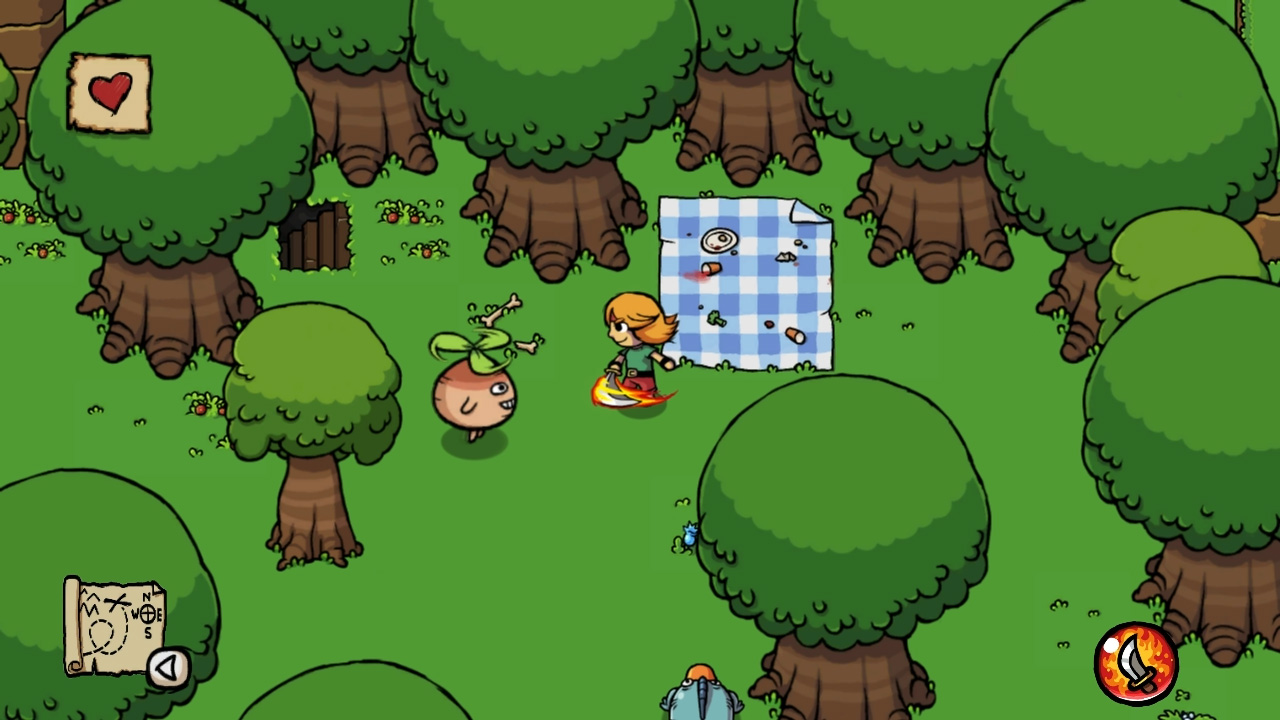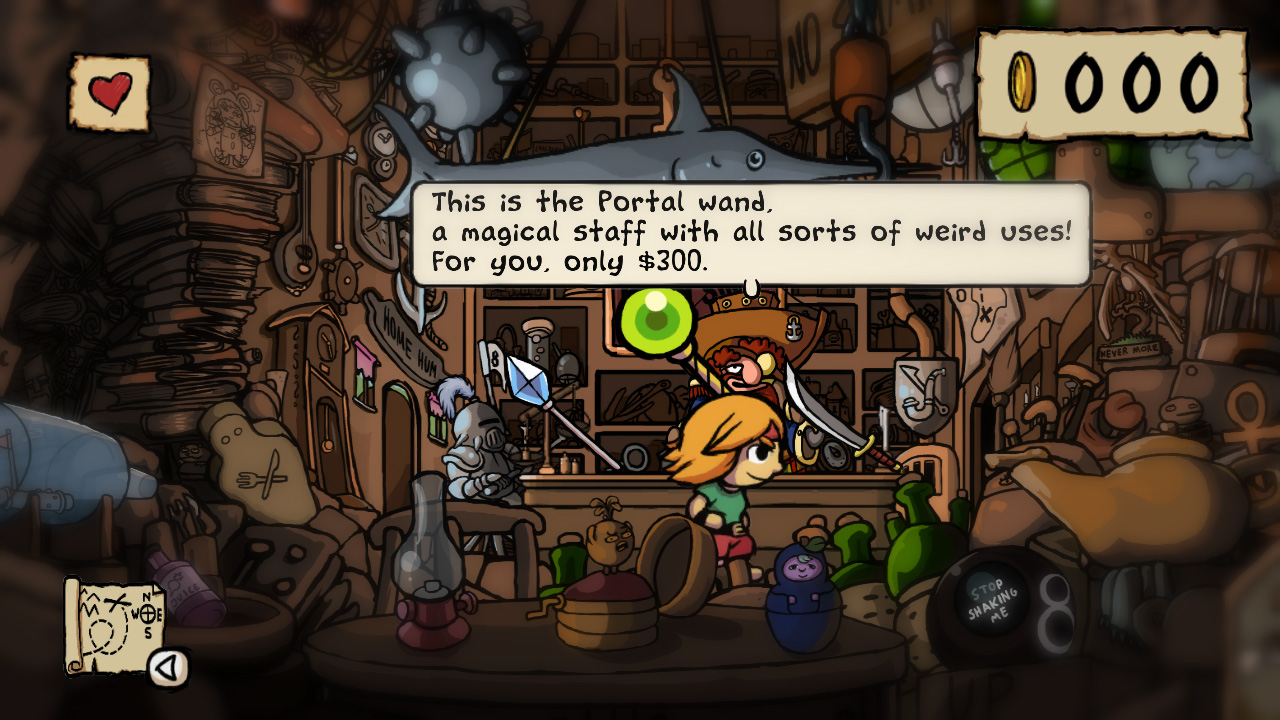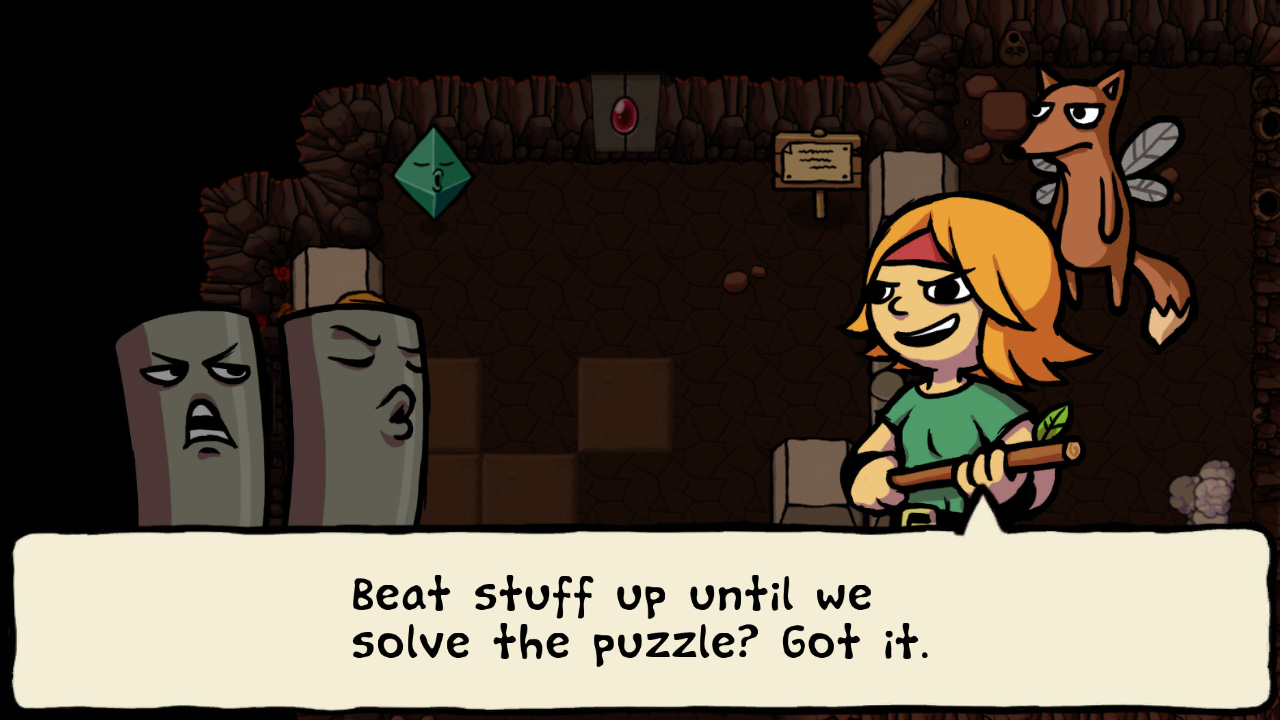
As far as Zelda clones go, Ittle Dew is at the very least, serviceable. The problem is, the game’s been released so many times on so many different consoles since its culmination almost seven years ago, that amongst the plethora of other Zelda-likes on the Switch, it’s hard to see where Ittle Dew finds its place.
But for the three or so hours it will take you to complete Ittle Dew, the games whimsy and simple (yet often difficult puzzles) will keep you entertained. While it doesn’t have the depth of many other games of a similar ilk, and especially its bigger AAA cousins, the block puzzles, handful of tools at your disposal and absurd enemies to battle are sufficient enough to keep the journey interesting. As far as storylines go, Ittle Dew is light on content, but big on personality – our titular character is dropped onto a mysterious island, with his wise-cracking magic fox sidekick Tippsie at his side. To escape the island, you need to hunt through a giant castle in search of a secret relic, with plenty of tricks and secrets to work through on the way.
Gameplay is simple and you won’t have any trouble mastering the system – fighting is as easy as swinging your sword to take out the crawling platypus’, giant pancake creatures and onesie wearing bad guys, but they rarely put up much of a fight back. In fact, that’s one of my biggest frustrations with Ittle Dew – many enemies spend their time wandering around aimlessly, completely oblivious to your presence. In comparison, boss battles are slightly more interesting, boasting the typical ‘follow the rhythm and find their weakness’ system that you see in many similar games. In short, Ittle Dew does not so much reinvent the wheel, but rather sticks to the treads of generic gaming tropes to provide a simple but functional experience.
And while there are only a few things to unlock, the items are great to use, but you’ll find more of a purpose to them during puzzle solving as opposed to combat. Many puzzle situations require you to open doors by block pushing, and while it’s all relatively generic, there’s a decent difficulty curve to these conundrums and the game requires a degree of logic to work through. Some of the puzzles will require you to backtrack once you unlock new items before you can solve, but as the map is relatively small and most of the action takes place in the castle grounds, it doesn’t feel tedious to have to retread old sectors.
As well as block pushing, there are plenty of puzzles that involve moving bombs to blow up walls, as well as manipulating enemies to open doors. One of the items you unlock is a portal wand that lets you move items and enemies to new locations, and sending enemies to an untimely death by zooming them to a pile of spikes is incredibly satisfying. While the amount of new items to unlock are low (only three, in fact), it’s great that they’re all useless and make a difference to the bigger picture.
If, once you have worked your way through the games short campaign, you still want more of Ittle Dew, there are a bunch of cards spread through the world that you can unlock. It gives the game a little more depth, but they only serve as collectables. They are however usually held behind difficult puzzles that are tough to solve, and while for most players, you’ll grab these by chance if you come across them, the options there if you’re really want to get your moneys worth throughout Ittle Dew.
But while Ittle Dew is wholly functional, maybe the most glaring issue is it looks incredibly dated. Seven years ago, the bright-coloured, hand drawn style would have been totally passable for a top down adventure game like this, in comparison to the fantastic remake of A Link Between Worlds, and even other Zelda-likes such as Oceanhorn (which is almost the same age as Ittle Dew) look worlds apart. It’s a shame that this hasn’t been given the remake treatment, as opposed to just being ported, but for the small price tag you can’t really as for more.
Ittle Dew is just, fine. It was a decent adventure game on release, and it is still that now. Combat is far too simple and unrefined, but while the puzzles are monotonous, they offer a decent difficulty spike even if they lack much variation. Above all else though, there’s plenty of better Zelda clones, but if you’re after a cheap adventure you can waste a couple of hours with, you can do much worse than Ittle Dew.
REVIEW CODE: A complimentary Nintendo Switch code was provided to Bonus Stage for this review. Please send all review code enquiries to press@4gn.co.uk.
Subscribe to our mailing list
Get the latest game reviews, news, features, and more straight to your inbox
Thank you for subscribing to Bonus Stage.
Something went wrong.
Ittle Dew Review
-
Gameplay - 6/10
6/10
-
Graphics - 6/10
6/10
-
Sound - 7/10
7/10
-
Replay Value - 5/10
5/10
User Review
( votes)Overall
Summary
Ittle Dew is still the same seven years on, and that’s really the biggest issue with this Zelda clone.





